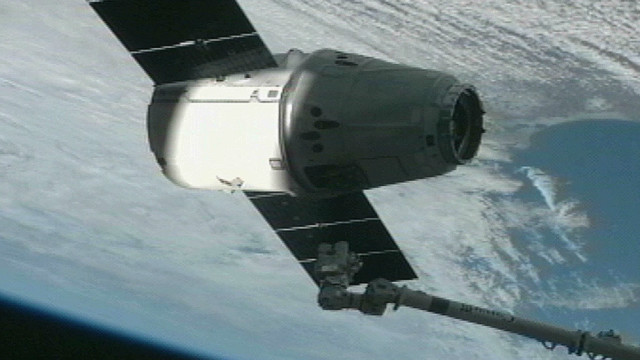Story highlights
- The International Space Station has captured the SpaceX's Dragon capsule
- The unmanned Dragon is carrying more than 1,200 pounds of supplies
- It suffered a temporary glitch with its thrusters after it launched into orbit
After a technical hiccup, SpaceX's Dragon cargo capsule reached the International Space Station on Sunday.
The unmanned Dragon is carrying more than 1,200 pounds of supplies for the crew and the crew's experiments. The station's robotic arm captured the Dragon at 5:31 a.m. ET, NASA said.
The arm will guide the supply capsule into the station, and the Dragon completed the attachment at 8:56 a.m. ET, SpaceX said in a post on its Twitter account.
The Dragon suffered a temporary glitch with its thrusters after it launched into orbit Friday from Cape Canaveral, Florida.
Shortly after the capsule separated from its rocket, SpaceX determined three of the capsule's four thruster pods -- which it would use to reach the station -- weren't operating. The problem appeared to be "an issue with a propellant valve," SpaceX spokeswoman Christina Ra said.
The company said the problem appeared to be fixed by Friday afternoon.
"Thruster pods one through four are now operating nominally. Preparing to raise orbit. All systems green," SpaceX CEO Elon Musk posted on Twitter Friday afternoon.
The supply mission is SpaceX's second of a planned 12 under a contract with NASA.
SpaceX became the first private company to deliver supplies to the station on NASA's behalf in October.
NASA chose SpaceX's Falcon 9 launch vehicle and the Dragon spacecraft to resupply the space station in 2008. The space agency has retired its fleet of space shuttles and plans to turn much of its focus toward exploring deep into the solar system.





